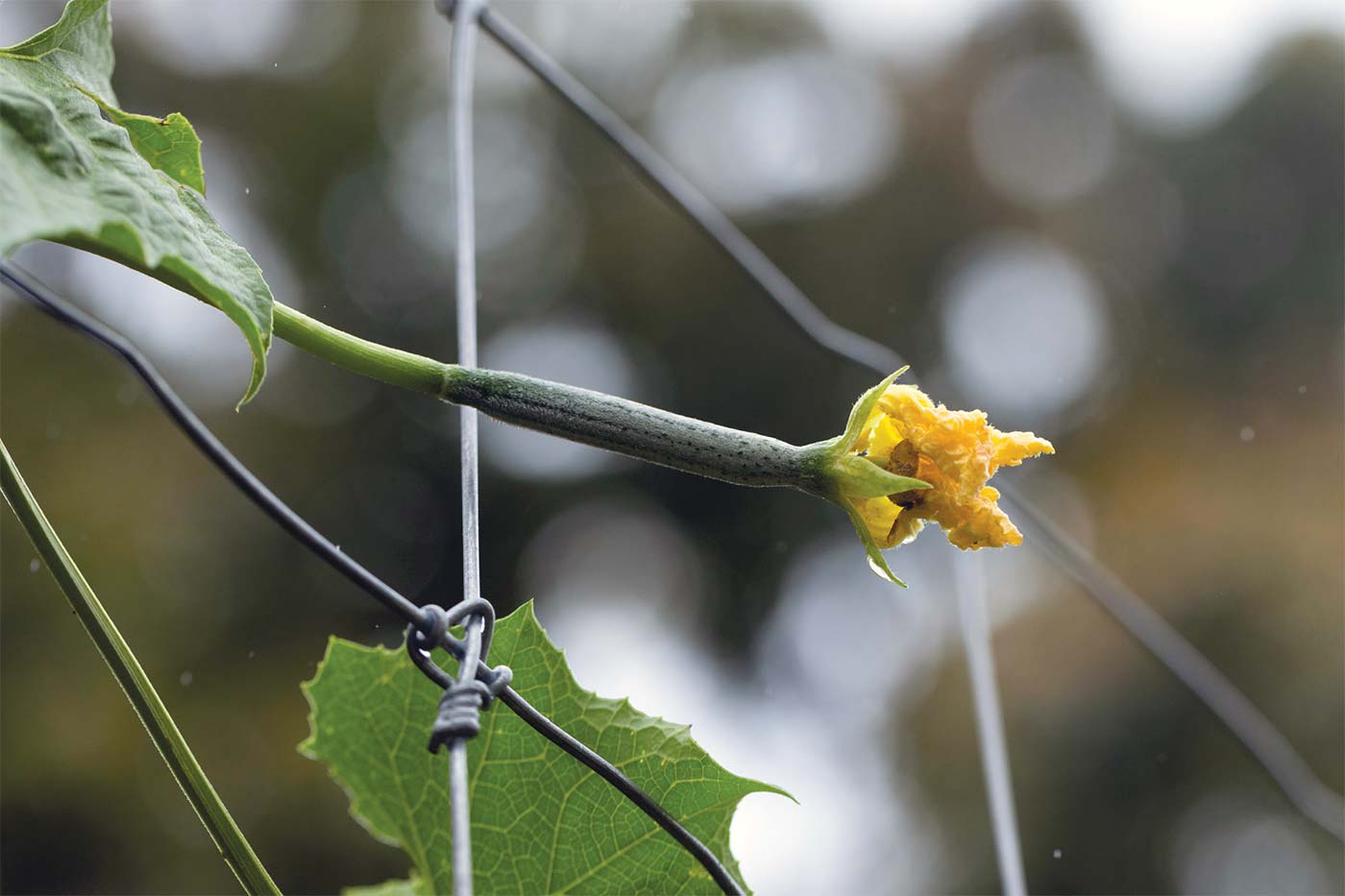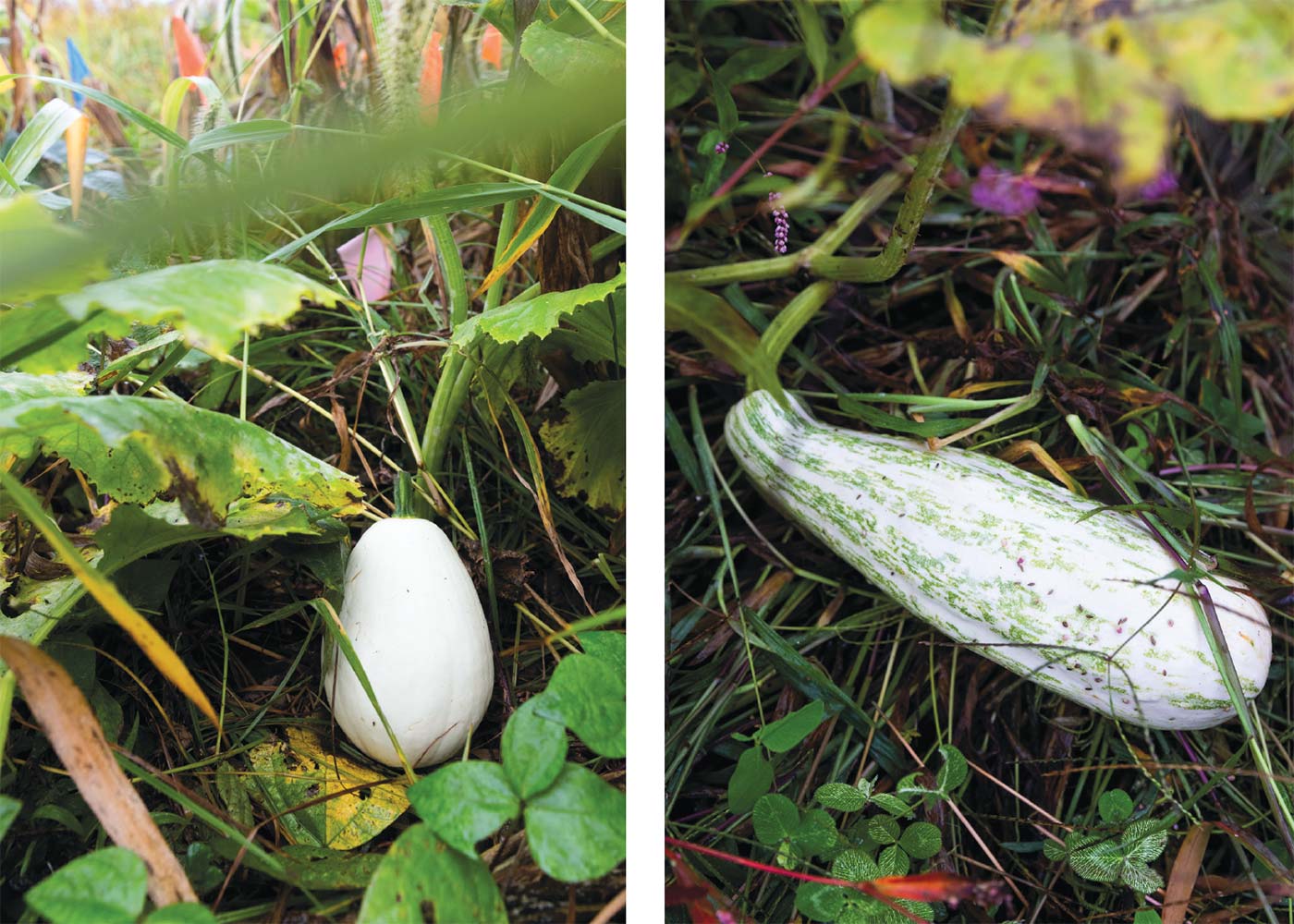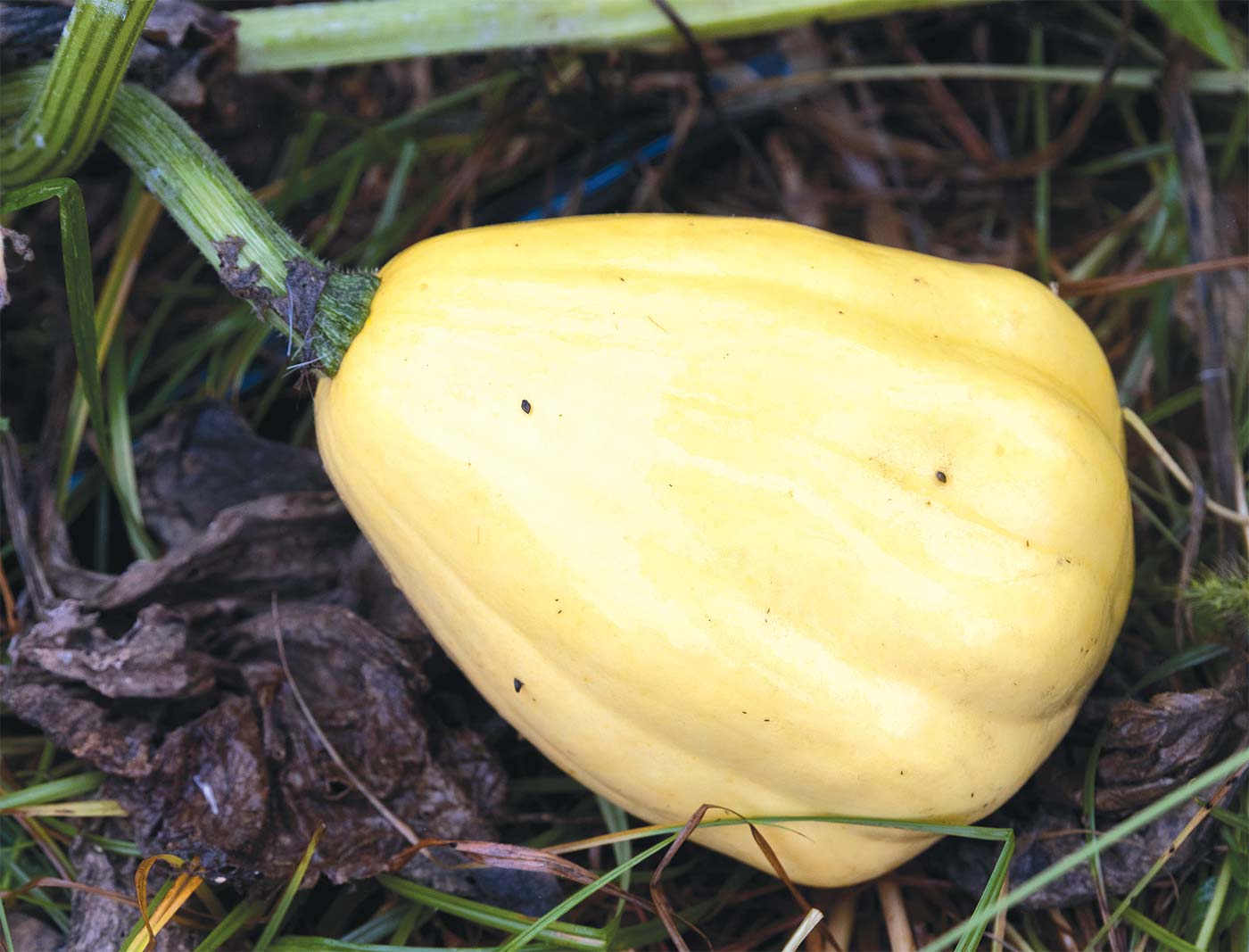Ancestral Gifts: The Revitalization and Rematriation of the Maycock & Nanticoke Squash
In the first growing season at Princeton University’s Seed Farm, Nate Kleinman, co-founder and co-director of the Experimental Farm Network cooperative in Elmer, asked Seed Farm Director Tessa Desmond to grow Nanticoke squash—a highly diverse winter squash that Kleinman has been refining over the past decade by saving and replanting seeds from the most flavorful squash of each year’s crop. Although Kleinman got his original Nanticoke seeds from the Seed Savers Exchange in Iowa, the squash’s ancestral home is with the Nanticoke people, an Indigenous tribe in the Chesapeake and Delaware Bay regions who, today, live primarily in Delaware and Southern New Jersey.
When Desmond asked about traditional practices for harvesting the Nanticoke squash seeds, Kleinman suggested they request guidance from Courtney Streett, co-founder, president, and executive director of Native Roots Farm Foundation, a Nanticoke-led nonprofit working to reconnect Indigenous people with aspects of their heritage, including crops and foodways.
In January 2023, Streett came to the Seed Farm to harvest seeds and inform students in Desmond’s course entitled “Land and Story in Native America” about Indigenous peoples' relationships with the natural world. Streett was joined by Karelle Hall, a PhD student at Rutgers who is working to revitalize the Nanticoke language, which has had no first-language speakers since the 1800s. As the group chatted while harvesting seeds, Kleinman mentioned that he also had Maycock squash seeds. Excited by that news, Hall explained that macac is the Nanticoke word for squash— a connection that deepened Kleinman’s own story of how he came into possession of these seeds.
In the 1980s, Kleinman shared that food ethnographer, culinary historian, and heirloom seed saver William Woys Weaver was invited to give a talk in Mullica Hill. In lieu of his speaking fee, he asked his hosts to invite attendees to bring along heirloom seeds that they had been saving. One of those attendees was Fanny Johnson, an elder in the Nanticoke tribe, who came over from Delaware with the seeds of a squash that she called the Maycock. Fearing the variety would disappear once she was gone, Johnson asked him to help perpetuate those seeds.
When Weaver planted the Maycock seeds, he found that the squash grew in a startling array of shapes and colors. Using early texts and botanical paintings of historical types of squash as a guide, he worked to separate the diverse squash into distinct varieties through generations of seed selection. Several varieties were eventually selected out from Fanny Johnson’s original Maycock seeds, including “blocky yellow,” “white warty,” “striped,” and “tall white.” Weaver gave a handful of seeds from each selection to Kleinman in 2021.
In consultation with members of the Nanticoke community, Kleinman decided to recombine the four varieties in an attempt to return the Maycock to an approximation of the squash grown from Fanny Johnson’s original seeds—re-creating a squash that has one name but grows in a mix of colors, shapes, and sizes. That work requires allowing the separated Maycock varieties to cross-pollinate with each other while also ensuring that the genes of other types of squash aren’t introduced by honeybees and other pollinators.
“IT IS INCREDIBLY POWERFUL TO HAVE THE OPPORTUNITY TO HOLD THESE SEEDS—THESE GIFTS FROM OUR ANCESTORS THAT CONNECT THE PAST, THE PRESENT, AND THE FUTURE—AND TO SHARE THEM WITH LOCAL TRIBAL MEMBERS.”

The Seed Farm’s genetic isolation made it an ideal place to grow seed crops for the Maycock without fear of them being crossed with other squash varieties growing nearby. In 2023, Desmond and her students planted all four varieties and allowed them to freely cross-pollinate with each other. That combining of genes through cross-pollination means the seeds saved from that year’s squash were the start of many generational cycles of cross-pollinating, seed selection, and replanting that will eventually bring Weaver’s four varieties back together into a single—yet highly diverse—variety.
When the Seed Farm’s Maycock reached the point where they would typically be harvested, Kleinman worked with Desmond’s students to process some of that squash for drying using the Nanticoke people’s traditional method of spiral cutting. This act of cutting and drying the bulky squash had eased its transport during the Nanticoke’s annual inland migration from their coastal summer home and preserved it for use throughout the winter.
The remainder of the Seed Farm’s Maycock were left to grow until the seeds were mature, which happens when the squash is well past its prime eating phase. When ready, Desmond’s students harvested the seeds and gave them back to Kleinman. Some of those seeds were then given to Streett and Native Roots Farm Foundation to share with their community. Some were given to the Ujamaa Cooperative Farming Alliance, a collective of BIPOC farmers and gardeners who cultivate and distribute heirloom seeds, to share with the Piscataway, a related tribe in southern Maryland. And some were returned to the Seed Farm to be grown out again in the summer of 2024 to replenish the seed stock and continue the process of bringing the Maycock back together.
Somewhere along the way, the title “Maycock and Nanticoke Squash Revitalization Project” began to be used to describe this collaboration among Experimental Farm Network, Native Roots Farm Foundation, The Seed Farm, and Ujamaa Cooperative Farming Alliance. In addition to restoring the Maycock, the collaborating partners work together to rematriate these two squash to the Nanticoke, as well as related Lenape and Piscataway communities, across the region. The Revitalization Project also engages in the recovery of the Indigenous agricultural wisdom and cultural knowledge related to the squash.
“The Nanticoke people were largely alienated from those seeds. Their relationship with those varieties had been severed by the time they came into my hands,” Kleinman says. “I knew from the get-go that we had a responsibility to work to get them back. And that doesn’t just mean handing seeds over. Rematriation really should be a process. It’s about making sure that the people you give the seeds to have the skills and resources to maintain them—and to make sure that they have support throughout that process.”
Native Roots Farm Foundation is leading the work to rematriate the squash within the Nanticoke, Lenape, and Nanticoke Lenni-Lenape communities in Delaware and New Jersey, a process that Desmond is excited to explore along with them. Even if the Seed Farm could grow large quantities of seed, Desmond notes, “if nobody’s eating it, nobody’s using it, it’s not revitalized. We have just replenished the stock. To revitalize that crop, it has to become a part of the life of its people.”
That work of rematriation began in 2022 and 2023, when Native Roots Farm Foundation shared Nanticoke squash seeds and seedlings among members of the Three Sisters tribal communities within the region: the Nanticoke Tribe, Lenape Indian Tribe of Delaware, and Nanticoke Lenni-Lenape Tribe in southern New Jersey. In 2024, the Maycock was included in that process. And both squashes were used in a Three Sisters garden that the Native Roots Farm Foundation planted this past summer in its home state of Delaware.
“Nanticoke Squash were cultivated by and named after the Nanticoke people, but few members of our community were aware of this plant until NRFF helped rematriate it in 2022,” Streett wrote in an email. “It is incredibly powerful to have the opportunity to hold these seeds—these gifts from our ancestors that connect the past, the present, and the future—and to share them with local tribal members. People are so excited to engage with these seeds and plants!”
Expressing gratitude for the partnership with Desmond and Kleinman that is helping reunite these squash with their human relatives, Streett summed up what this work means to her community:
“This is an act of food sovereignty that connects tribal members with ancestral foods and restores culturally significant plants to their gardens and palates,” she wrote. “Nanticoke Squash are a tangible link to our past that says we are still here, we have always been here, and we will continue to be rooted to this land.”
“THE NANTICOKE PEOPLE WERE LARGELY ALIENATED FROM THOSE SEEDS. THEIR RELATIONSHIP WITH THOSE VARIETIES HAD BEEN SEVERED BY THE TIME THEY CAME INTO MY HANDS,” KLEINMAN SAYS. “I KNEW FROM THE GET-GO THAT WE HAD A RESPONSIBILITY TO WORK TO GET THEM BACK.”

LEARN MORE
EXPERIMENTAL FARM NETWORK
experimentalfarmnetwork.org
Founded in 2013, EFN works to facilitate collaborative plant breeding and sustainable agriculture research in order to fight global climate change, preserve the natural environment, and ensure food security for humanity into the distant future.
KARELLE HALL
Karelle Hall received a PhD in anthropology for her work on Nanticoke and Lenape sovereignty. She is also a critical member of the Nanticoke language revitalization team, who are reclaiming Nanticoke words, concepts, cultural teachings, prayers, and songs. As part of this endeavor they have published a beginner Nanticoke language book titled "Once It Has Been Spoken...It Cannot Be Unspoken: Kutiikiitowaakanun."
NATIVE ROOTS FARM FOUNDATION
nativerootsde.org
Based in Delaware, this woman- and Native-led organization’s mission is to reclaim, cultivate, and celebrate Native relationships with land, plants, and community for the next Seven Generations.
ROUGHWOOD CENTER FOR HERITAGE SEEDWAYS
seedways.org
A non-profit educational organization devoted to heritage foods prepared from heritage seeds, the Center’s Seed Collection is the oldest private seed collection in Pennsylvania. Using its 5,000 food plants, the Center hosts educational presentations, workshops, food tastings, and dinners that explore our culinary heritage.
THE SEED FARM AT PRINCETON
seedfarm.princeton.edu
A 3.5-acre farm operated under the auspices of Princeton University, The Seed Farm is devoted to growing rare, culturally meaningful seed crops in cooperation with community partners, while also pursuing research into the art and science of heirloom plants.
UJAMAA COOPERATIVE FARMING ALLIANCE
ujamaafarms.com
Ujamaa, a Swahili word, literally means ”extended family“. This collective of emergent and seasoned BIPOC growers, farmers, and gardeners cultivates and distributes heirloom seeds while also growing culturally meaningful crops for food, healing, and textiles. Seed purchases at ujamaaseeds.com serve to support their efforts to increase the number of BIPOC growers of heirloom seeds.
UTOPIAN SEED PROJECT
theutopianseedproject.org
This hands-in-the-earth non-profit is committed to trialing crops and varieties in the Southeast. Its diverse community of growers, gardeners, farmers, foodies, cooks, and chefs embrace regional biodiversity as a means of creating a resilient and delicious food and farming system. The Project is currently working with The Seed Farm on a five-year research project to breed a high-oil-content okra variety.





